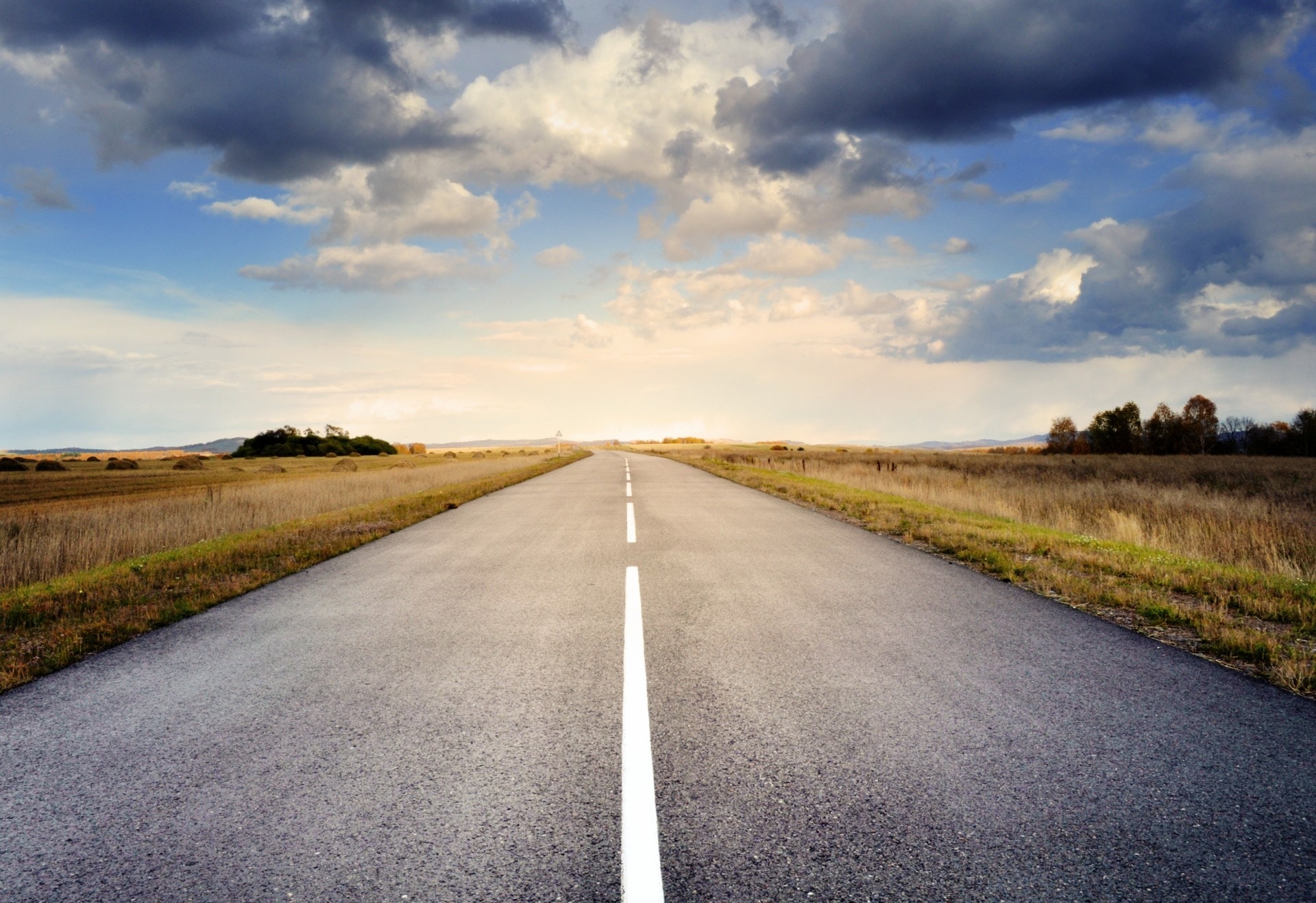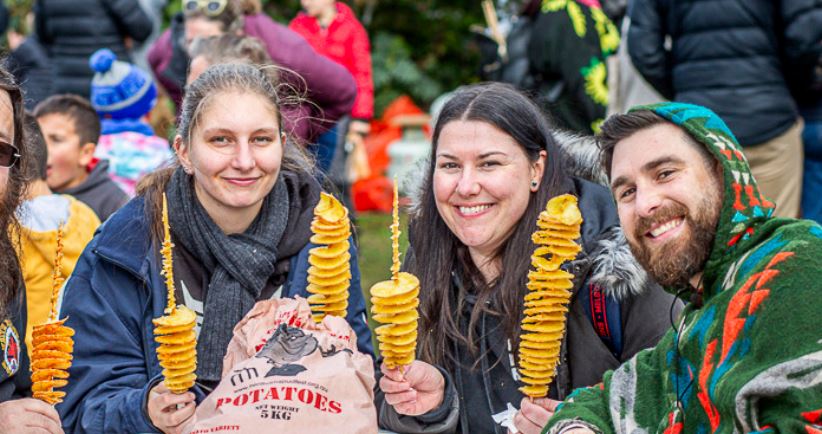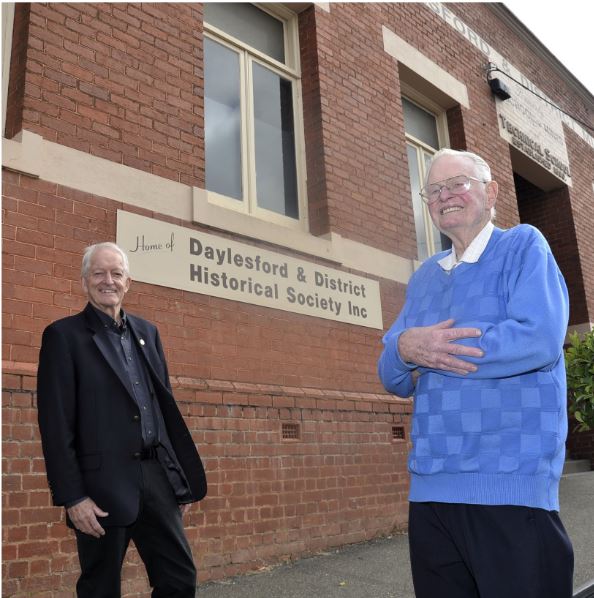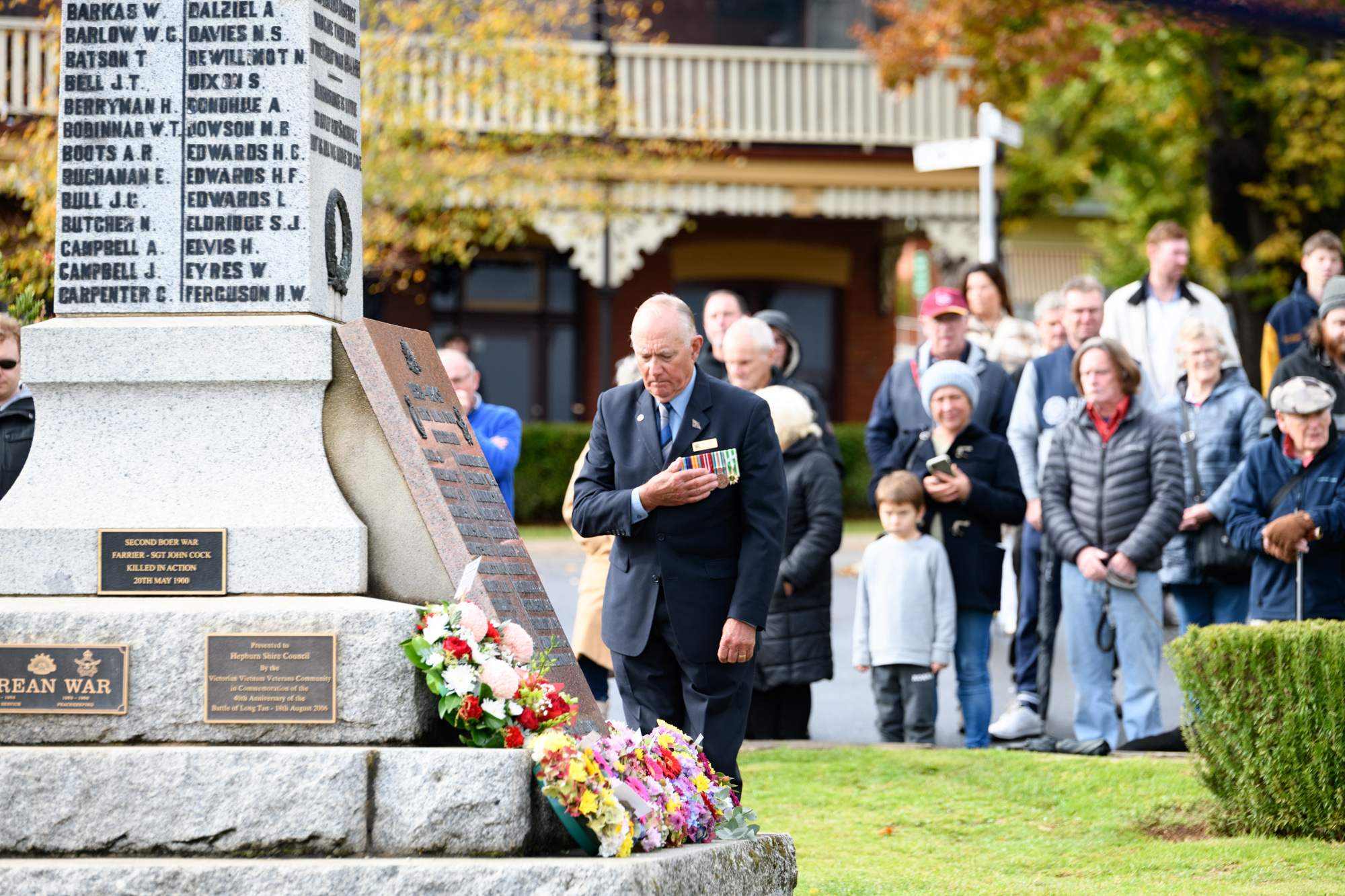June 19th, 2022The grey nomad life with Peter Young
MY wife Sally, aka “my gal Sal” has often reminisced sentimentally about happy childhood holidays on the Murray and at Eildon in her family’s tiny plywood teardrop caravan.
I was nevertheless surprised when she announced, as her retirement loomed, that she was going to combine a modest family inheritance and her new buckets of leisure time and buy a caravan.
Becoming a grey nomad, or in my case, bald nomad, wasn’t the last thing on my bucket list. It wasn’t even on my bucket list.
Fours years, 15,000 kilometres and 127 overnight camping spots later, I’m happy to report we’re both hooked.
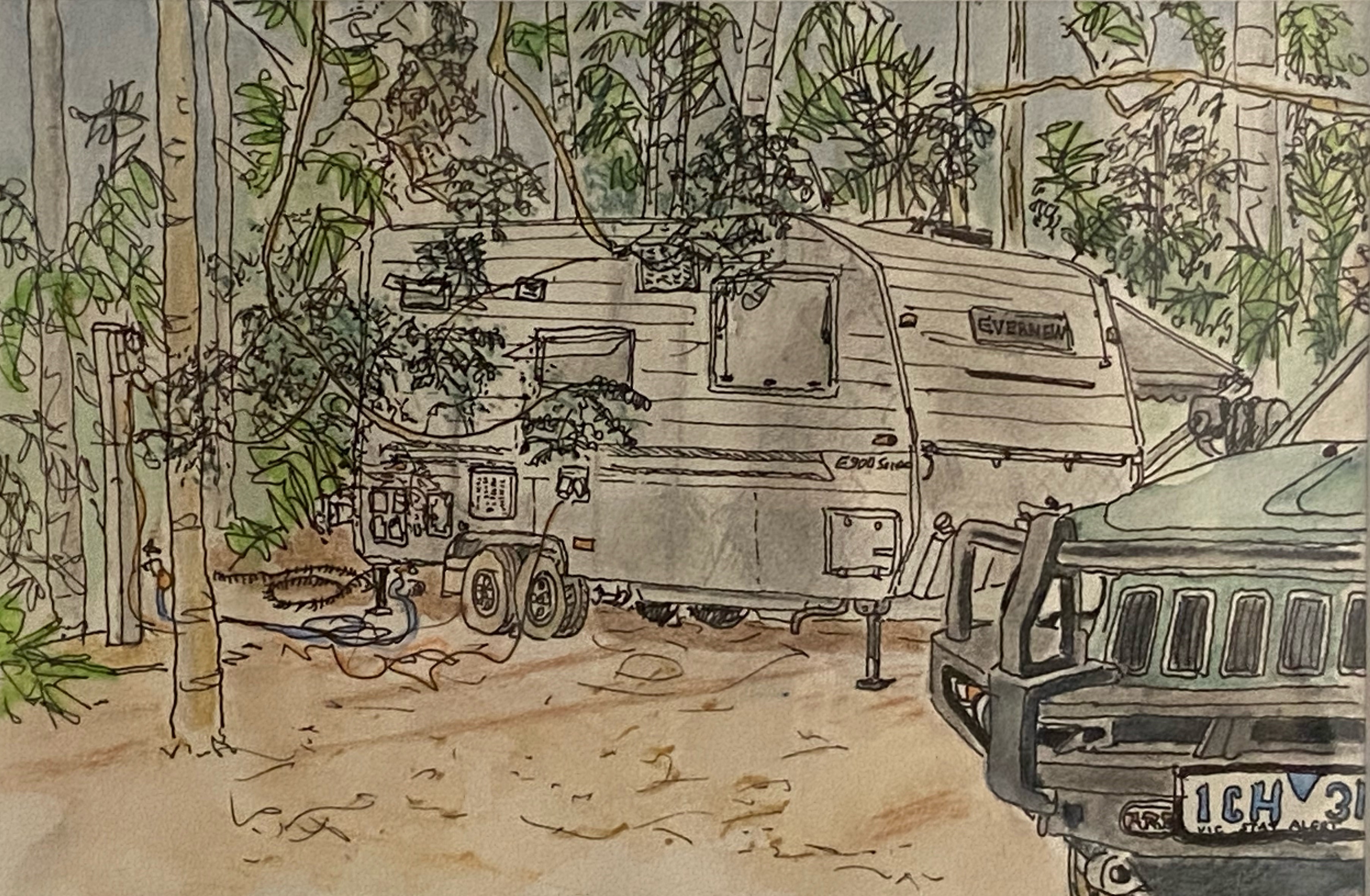
Now both retired, we use the van as our winter escape from Trentham.
Broadly, the plan is to follow the bonnet north to anywhere warm and reasonably amenable and drop anchor, spending July-October in tee-shirts, shorts and flip flops.
And our mega anxious dog, Neurotica, has, amazingly in my view, adjusted well as well.
She is fine with her cosy safe-haven corner in the van, as long as my gal Sal is within constant sight.
The 127 places we’ve slept the length and breadth of Australia range from free camp sites, usually gravel and/or dirt patches offering no amenities by the side of the road in the middle of nowhere half way across the Nullarbor up the coast of WA, down the centre from Darwin to the south coast of our nation, and out west in remote back blocks Queensland to lavish tropical resorts boasting multiple pools, bars, restaurants and games rooms.
We’ve been to every state and territory except Tasmania but who knows, that might be on the cards one day as we hear from fellow travellers, including plenty of Tasmanians, who visit the mainland as grey nomads, that lots of folk take caravans, campers and mobile homes across the Bass Strait on the ferry.
We’ve learned a lot along the way.
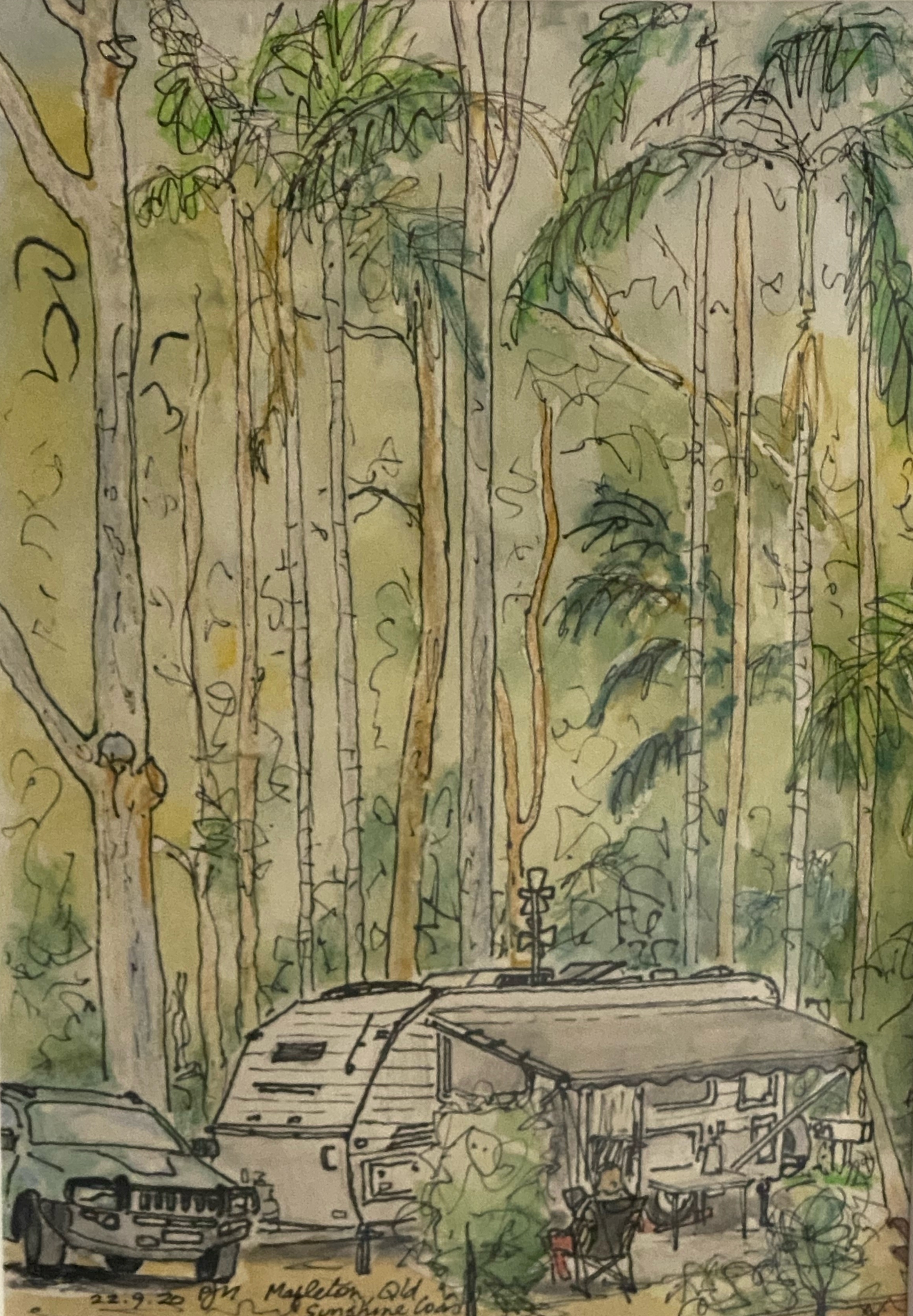
Caravanning is way different to the child bride’s childhood days.
We have, for instance, nicknamed our relatively modestly sized 19-foot, 2-inch, 2.2-tonne van “The Hyatt on Collins on wheels”.
Solar power runs the lights, water pump, bedside fan and TV when we roadside camp off grid, and gas keeps the shower water hot – we can carry 180 litres of fresh water – and runs the fridge, oven, cooktop and portable Weber BBQ on those nights as well.
There is diesel-fuelled central heating to keep us cosy on nights such as below zero stopovers in a truckies’ parking bay just east of the Nullarbor roadhouse which we share with a hulking semi, or at Uluru overlooking that majestic rock.
And when connected to 240-volt power, as we are in most caravan parks, the air con is mega-efficient at stopping the van turning into a sweltering tin box.
Extensive insulation and double glazing helps on that front too.
The outside, roll-out awning gives us a sheltered outdoor spot, specially when drop-down privacy screens are attached, for our portable chairs, tables and Baby-Q BBQ which runs off the gas bottles padlocked to the front of the van.
Cooking outdoors keeps heat and cooking smells out of the van and lends itself to social connection with fellow campers.
Go below floor, and under the rugged, double-dipped galvanised chassis lurks a bunch of hi-tech help I don’t understand which helps ensure the van tows straight and level without swaying and stops fast and straight when you stomp on the brakes when a giant bullock wanders onto the Stuart Highway while you are travelling south at 100km/hour with a 30-metre road train roaring south in the only other lane.
All in all, a far cry from the rugged outback camping of my youth when going to the dunny involved taking a shovel and digging your own hole!
The freedom to roam largely as you will, the fascination of seeing so much of our vast, largely flat, dry and empty country and meeting its usually proud and welcoming locals, has made the grey nomad life amazingly popular, and has brought lucrative tourism dollars to many small remote and otherwise economically-blighted communities.
It has also made the caravan industry into big business, with more than 100 locally-made caravan, camper van and camper trailer brands being lugged around the nation.
Covid has driven an enormous boom as Aussies who were unable to travel overseas decided to take the opportunity to see their own country from ground level.
The delivery time for a new caravan pre-Covid was three months, that blew out to 12-plus months at the height of restrictions, and the value of second-hand vans went through the roof.
Simultaneously, roads and popular locations were packed and booked out months ahead. Sal and I were laughed at when we tried to book Broome with three weeks’ notice and were told popular sites had been booked a year in advance.
Ditto Ellis Beach just north of Cairns and just about everywhere else in Far North Queensland.
Media reports said vans were camping in the streets of Kununurra and Cooktown because grey nomads who hadn’t booked ahead found no accommodation available in local camping grounds and caravan parks.
Interstate Covid restrictions were a challenge on our last two treks but judicious use of good luck and reasonable management saw us through.
We crossed the Murray into New South Wales 36 hours before it shut its border in 2020 and trundled into Queensland several weeks later, by fluke, four days before it shut its border, flashing our border passes to a scary looking, black-clad cop who proved mega-friendly.
We’ve kept print-outs of our border passes to show our grandchildren that Australians once effectively needed passports to travel within our own nation.
Last year proved more challenging than the year before, getting locked down at Palm Cove because of a local Covid breakout, and then finding our path home through NSW was blocked when that state locked down.
A 2000-km detour from Townsville to the Northern Territory, then down through Alice to Port Augusta and east to the Murray River at Renmark, where the child bride cheered herself hoarse watching the Dees win the AFL flag on the van TV (local big-screen pub gardens banned dogs) proved to be a diverting detour.
We were initially denied entry into the NT at a remote Queensland border roadblock west of Mt Isa as we arrived 48 hours ahead of our authorised border pass paperwork details.
A tiny skinny woman who looked like a high school kid in a senior constable’s uniform with a giant pistol on her hip proved firm, insistent but friendly and efficient.
She showed us how to stand on one leg on a crushed ant hill and point our 3G-connected phones at invisible satellites somewhere up there to apply for and to our amazement, receive new online passes.
We camped by the road that night and were visited by a horse which stuck its head in the open door of the van and was nipped for its troubles by a very unimpressed Neurotica.
We have met all sorts of fellow travellers on the road.
Couples who sold up, bought huge rigs that are virtual homes on wheels, stuck an “adventure before dementia” sticker on the back, and hit the road as a permanent lifestyle, often taking short-term casual work on the way.
Couples with little kids doing remote learning lessons as they travel. They almost all say the kids get a better education from the travel than they do from their books.
There are people who telecommute. A dude in Port Macquarie was running his graphic design business from inside his van while his wife did therapeutic massage under the awning outside his door.
And lots of nice folk like us, wandering open-jawed to see how wonderful Australia is.
And how enjoyable is the roaming gypsy life.
As mentioned above, we’ve learned a lot.
“Travel light, travel bright – and save fuel and tow safer.”
If you are doing the famous “lap” around Australia travel anti-clockwise, there are less fuel-burning headwinds on average.
Importantly, while I’m yet to become a competent reverser of the van, we’ve learned to get backwards into tight spaces in a clumsy fashion without getting divorced while simultaneously providing amusement for fellow campers.
And I’ve learned that emptying and cleaning the removable 20-litre toilet canister is a job reserved exclusively for blokes!
Images: Peter Young


